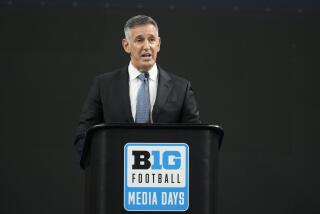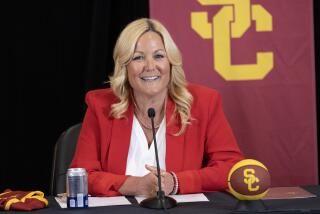College Leaders Reject Playoff Idea
NEW YORK — As fans and the media clamor for playoffs to decide college football’s champion, an array of university presidents and athletic officials said Wednesday they oppose any significant expansion of a season they say already commands too much attention on their campuses.
The controversy erupted Sunday when it was announced that USC, ranked No. 1 in both major polls, would be excluded from the title game in New Orleans’ Sugar Bowl on Jan. 4.
If anything, many administrators appeared to have stiffened their resolve amid the outcry from alumni, newspaper columnists and sportscasters.
“We’re trying to preserve what universities are all about,” said Gordon Gee, chancellor of Vanderbilt University in Nashville. “We have to take a stand and the stand is right here.”
Athletic officials attending a forum here this week said they might accept a “super game” to be added after the four major bowl games played on or around New Year’s Day.
But presidents and commissioners associated with several major conferences -- including the Pacific 10, Big Ten, Southeastern and Atlantic Coast -- said they would not be goaded into adopting a National Football League-style playoff.
“College presidents are subjected to a great amount of pressure on a daily basis,” said Tom Hansen, commissioner of the Pacific 10, which includes USC and UCLA. “Like all of us, they tend to become resistant after that pressure reaches a certain level.”
University presidents and chancellors, through their control of the National Collegiate Athletic Assn., have the final say in intercollegiate athletics.
The NCAA conducts championship playoffs for every sport except Division I-A football, the game’s top level. As it stands, the season ends with 28 bowl games that stretch from mid-December into the new year.
The teams that play in the designated championship game -- which rotates among the Rose, Orange, Fiesta and Sugar bowls -- are chosen through a complex formula of polls, computer ratings and other factors.
The bowl championship series, or BCS, has been under fire since its inception in 1998. The criticism reached a crescendo when USC, ranked No. 1 in the Associated Press media poll and the USA Today/ESPN coaches’ poll, was snubbed.
No. 2 Louisiana State and No. 3 Oklahoma, which, like USC, each have one loss, were chosen instead. USC will face No. 4 Michigan in the Rose Bowl.
“This year, the BCS was a silly answer,” USC President Steven Sample said in a telephone interview. “But I don’t think it is broken.” Sample, who does not support a playoff, added that “there was no malice” in USC’s exclusion.
Similarly, other presidents have sought to remain above the cacophony.
“They’re not waking up in the middle of the night thinking about this,” said Gene Marsh, a law professor and faculty athletics representative at the University of Alabama. “They’re not out there in a great big circle of people trying to remake the BCS.”
To the extent they have considered the problem, administrators offer many reasons to resist an eight- or 16-team playoff.
They worry that such a system would increase demands on athletes already distracted from classwork, arguing that the playoffs held in Divisions I-AA, II and III football pose a lesser burden than what would arise at the game’s most glamorous level.
They want to preserve what James Moeser, the University of North Carolina chancellor, called “the tradition ... the color of the bowls.”
Some of the less prominent bowl games might not survive a transition to playoffs.
“People might say those smaller bowls aren’t important,” said John Swofford, commissioner of the Atlantic Coast Conference. “But they’re important to the two schools playing in them and the student-athletes and the local cities.”
In addition, football is more physically demanding than other sports, officials said, meaning teams could schedule only one playoff game a week, compared with sports such as lacrosse or basketball that can play several.
All of these factors add to the politics of leading a university, which includes trying to balance academics with athletics.
Presidents and chancellors said they are continually dismayed when their announcements of some academic or research achievement are drowned out by calls from alumni wondering why they haven’t fired a struggling football coach.
“It’s a huge frustration,” Moeser said.
At Moeser’s campus in Chapel Hill, N.C., the $42-million athletic budget is dwarfed by $538 million in federally funded research conducted each year. “That’s the real importance of the university,” he said.
Last month, an oversight committee representing presidents from scores of major universities met in New Orleans, rejecting a playoff format and asking conference commissioners to adjust the BCS system.
Sample said he hopes the changes will involve a thorough review and something more than just “tweaking.”
The commissioners plan to report back early next year, Swofford said.
This strategy flies in the face of a windfall that could result from creating a playoff system.
College basketball’s “March Madness” tournament attracted a $6.2-billion TV deal with CBS and ESPN. How much might a football playoff be worth?
“Oh please,” said Len DeLuca, senior vice president of programming for ESPN, declining even to guess at an amount. “We would warmly engage in that conversation.”
The addition of a “super game” could mean $50 million to $100 million beyond the approximate $100 million in BCS television revenue, experts estimate.
“It seems to me that this year is set up perfectly,” said Cal State Long Beach President Robert Maxson. “Let USC play Michigan and LSU play Oklahoma and have the winners decide it on the field.”
A three-game playoff might be even more profitable if it could be wedged between the post-Christmas advertising lull and the NFL playoffs in January.
“The official vote of the [Southeastern Conference] is no playoff system,” said Mark Emmert, the chancellor at LSU. “But part of that might include, speaking for me, a model where a four-team playoff could work.”
Still, like other university leaders, Emmert isn’t losing any sleep over the matter.
“On the scale of issues that face me as an academic leader, it is about a 3,” he said, laughing. “We have to keep this in perspective. It is not about solving world hunger. It is about how we play football games.”
*
Times staff writers Bill Dwyre and Steve Henson contributed to this report.
More to Read
Go beyond the scoreboard
Get the latest on L.A.'s teams in the daily Sports Report newsletter.
You may occasionally receive promotional content from the Los Angeles Times.







